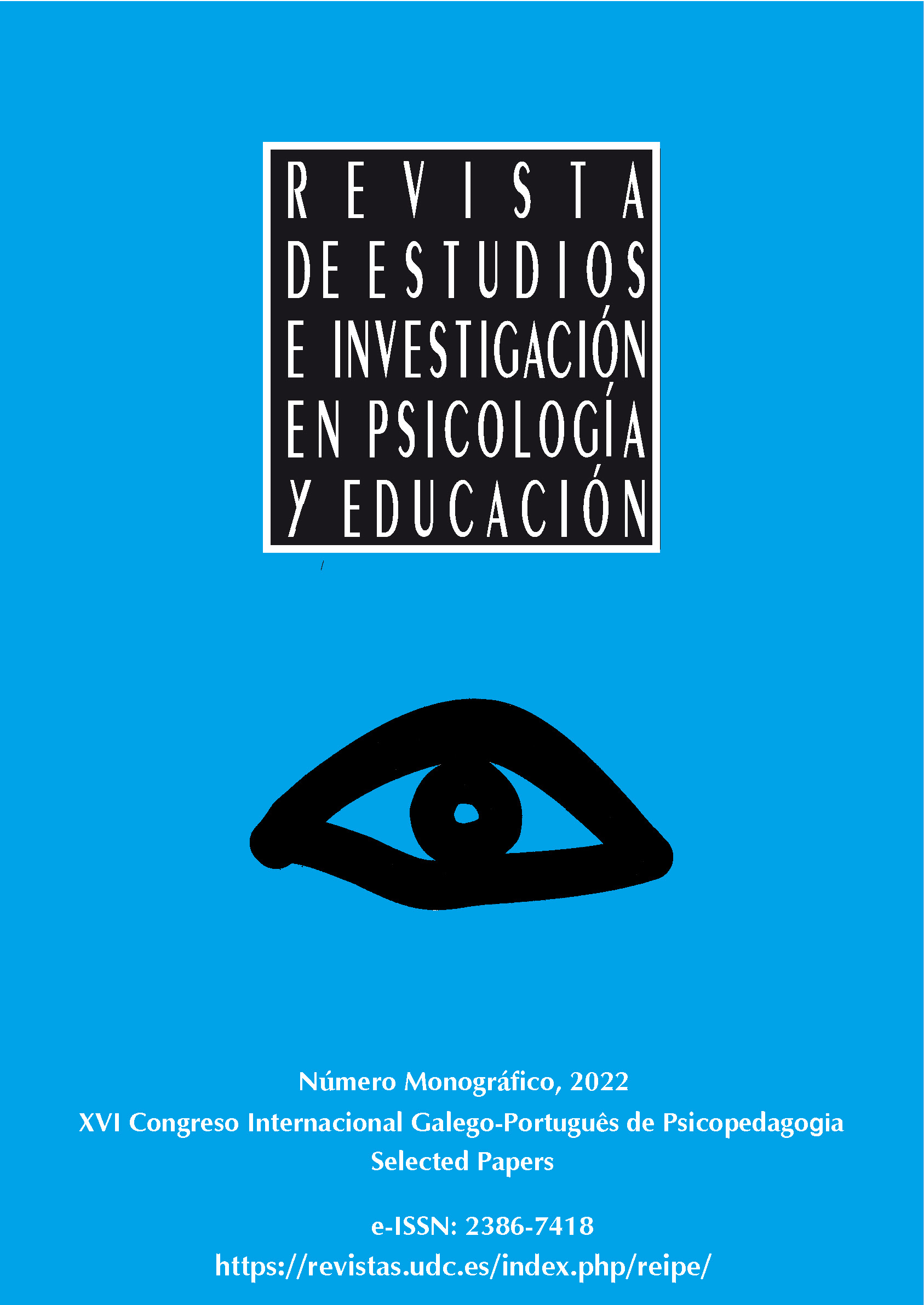Personality, resilience and subjective well-being of higher education students
Main Article Content
Abstract
This study aims to investigate the relationships between the personality, resilience, and subjective well-being of higher education students, testing the predictive value that resilience can add to personality dimensions. The sample consists of 197 participants, aged between 18 and 29 years, of both sexes. The Big Five Inventory (BFI), the Life Satisfaction Scale (SWLS), the Positive Affectivity and Negative Affectivity Scale (PANAS) - reduced version, and the Brief Resilience Scale (BRS) were used to evaluate the variables under study. The results were compared according to sex and the parents' departure from home, but there were no statistically significant differences in either. Statistically significant correlations were found between negative affectivity and neuroticism. Resilience was correlated with extroversion. Satisfaction with life presented significant correlations with kindness, awareness, and resilience. Moreover, positive affectivity showed significant correlations with resilience, satisfaction with life, and with all dimensions of personality, except with neuroticism. The results indicate that, effectively, the personality is a strong predictor of well-being, and that the capacity of resilience presents significant positive relations with satisfaction with life and positive affectivity and negative relationship with negative affectivity.
Keywords:
Downloads
Article Details
References
Arnett, J. J. (2007). Emerging adulthood: What is it, and what is it good for? Child Development Perspectives, 1(2), 68–73. https://doi.org/10.1111/j.1750-8606.2007.00016.x
DeNeve, K. M., & Cooper, H. (1998). The happy personality: A meta-analysis of 137 personality traits and subjective well-being. Psychological Bulletin, 124(2), 197–229. https://doi.org/10.1037/0033-2909.124.2.197
Diener, E., & Diener, M. (1995). Cross-cultural correlates of life satisfaction and self-esteem. Journal of Personality and Social Psychology, 68(4), 653–663. https://doi.org/10.1037/0022-3514.68.4.653
Diener, E., Emmons, R. A., Larsen, R. J., & Griffin, S. (1985). The Satisfaction With Life Scale. Journal of Personality Assessment, 49(1), 71–75. https://doi.org/10.1207/s15327752jpa4901_13
Ferreira, J. A., Francisco, M., Félix, D. (2021). The Brief Resiliency Scale para a população portuguesa. (trabalho não publicado). Faculdade de Psicologia e de Ciências da Educação da Universidade de Coimbra
Galinha, I. C., Pereira, C. R., & Esteves, F. G. (2013). Confirmatory factor analysis and temporal invariance of the Positive and Negative Affect Schedule (PANAS). Psicologia: Reflexão e Crítica, 26(4), 671–679
Garcia, D., & Erlandsson, A. (2011). The relationship between personality and subjective well-being: Different association patterns when measuring the affective component in frequency and intensity. Journal of Happiness Studies: An Interdisciplinary Forum on Subjective Well-Being, 12(6), 1023–1034. https://doi.org/10.1007/s10902-010-9242-6
John, O. P., Donahue, E. M., & Kentle, R. L. (1991). The Big Five Inventory--Versions 4a and 54. University of California, Berkeley, Institute of Personality and Social Research
Kaplan, H. B. (1999). Toward an understanding of resilience: A critical review of definitions and models. In M. D. Glantz & J. L. Johnson (Eds.), Longitudinal research in the social and behavioral sciences. Resilience and development: Positive life adaptations (p. 17–83). Kluwer Academic Publishers
Lucas, R. E., & Diener, E. (2009). Personality and subjective well-being. In E. Diener (Ed.), The science of well-being: The collected works of Ed Diener (pp. 75–102). Springer Science + Business Media
Lucas, R. E., & Diener, E. (2008). Subjective well-being. In M. Lewis, J. M. Haviland-Jones, & L. F. Barrett (Eds.), Handbook of emotions (pp. 471–484). The Guilford Press
Lucas, R. E., Diener, E., & Suh, E. (1996). Discriminant validity of well-being measures. Journal of Personality and Social Psychology, 71(3), 616–628. https://doi.org/10.1037/0022-3514.71.3.616
Martins, M. H., & Jesus, S. D. (2007). Factores de resiliência e bem-estar: Compreender e actuar para resistir. Psicologia da Saúde: Teoria e Pesquisa, 85-113
Orozco-Solís, M. G., Bravo-Andrade, H. R., Ruvalcaba-Romero, N. A., & Alfaro-Beracoechea, L. N. (2021). Resiliencia en adolescentes: el papel de la conectividad con la escuela y familia. Revista de Estudios e Investigación en Psicología y Educación, 8(1), 20-36. https://doi.org/10.17979/reipe.2021.8.1.7097
Ozer, D. J., & Benet-Martínez, V. (2006). Personality and the prediction of consequential outcomes. Annual Review of Psychology, 57, 401–421. https://doi.org/10.1146/annurev.psych.57.102904.190127
Simões, A. (1992). Ulterior validação de uma escala de satisfação com a vida (SWLS) [Further validation of the Satisfaction with Life Scale]. Revista Portuguesa de Pedagogia, 26(3), 503–515
Simões, A., Ferreira, J., Lima, M., Pinheiro, M., Vieira, C., Matos, A., & Oliveira, A. (2000). O bem-estar subjectivo: Estado actual dos conhecimentos. Psicologia, Educação e Cultura, 4(2), 243-279
Simões, A., Ferreira, J., Lima, M., Pinheiro, M., Vieira, C., Matos, A., & Oliveira, A. (2003). O bem-estar subjectivo dos adultos: Um estudo transversal. Revista Portuguesa de Pedagogia, 37(1), 5-30
Smith, B. W., Dalen, J., Wiggins, K., Tooley, E., Christopher, P., & Bernard, J. (2008). The brief resilience scale: assessing the ability to bounce back. International Journal of Behavioral Medicine, 15(3), 194–200. https://doi.org/10.1080/10705500802222972
Society for the Study of Emerging Adulthood (SSEA). (2016). Overview. Retrieved from http://ssea.org/about/index.htm
Steel, P., Schmidt, J., & Shultz, J. (2008). Refining the relationship between personality and subjective well-being. Psychological Bulletin, 134(1), 138–161. https://doi.org/10.1037/0033-2909.134.1.138
Silva, O. D. L. D., Caldeira, S. N., Sousa, Á., & Mendes, M. (2020). Estratégias de coping e resiliência em estudantes do Ensino Superior. Revista E-Psi, 9(1), 118-136.
Wagnild, G. M., & Young, H. M. (1993). Development and psychometric evaluation of the Resilience Scale. Journal of Nursing Measurement, 1(2), 165-178.
Watson, D., Clark, L. A., & Tellegen, A. (1988). Development and validation of brief measures of positive and negative affect: The PANAS scales. Journal of Personality and Social Psychology, 54(6), 1063–1070. https://doi.org/10.1037/0022-3514.54.6.1063



